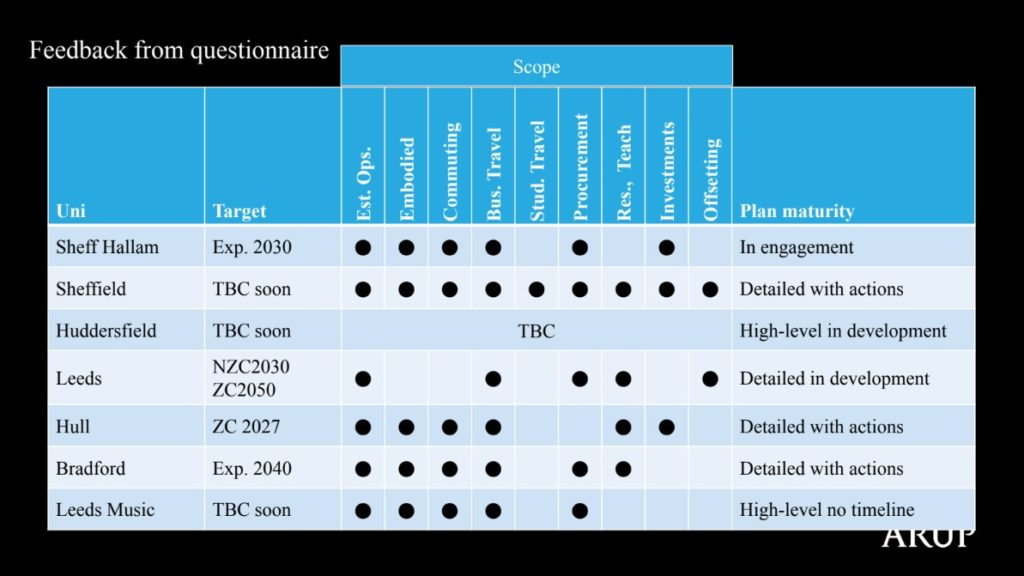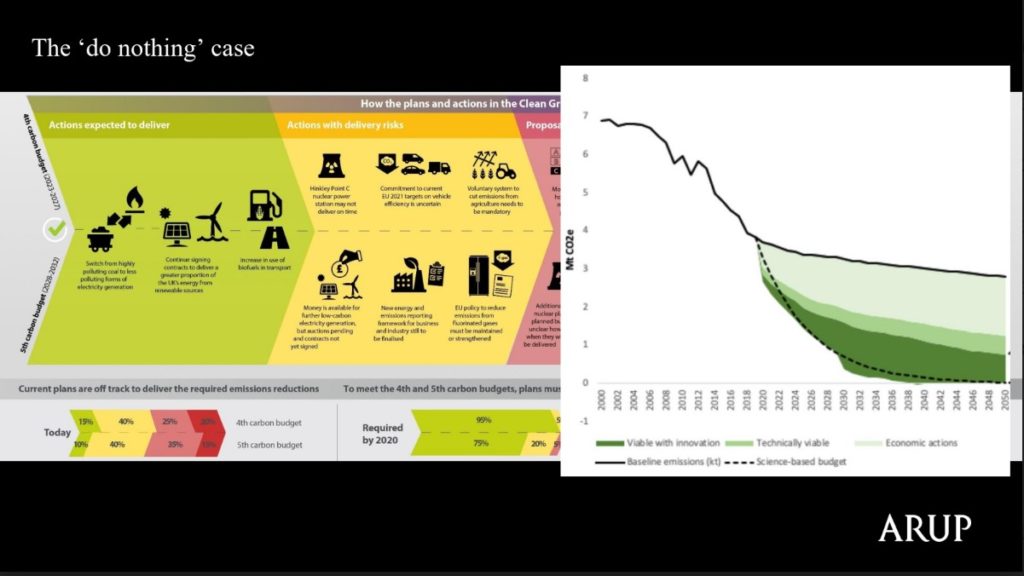Monika Antal and James Ransom
The COVID-19 crisis presents an opportunity to accelerate efforts to tackle the climate emergency that should be capitalised on, representatives from Yorkshire’s universities agreed at the 5 May virtual roundtable convened by Yorkshire Universities and Arup. Several key themes emerged:
1. Important work to tackle climate change was already underway before COVID-19…
Since MPs declared a climate and environment emergency in May 2019, all local authorities in which YU’s 12 member institutions are located have declared a climate emergency and have reflected this in their respective institutional targets and strategies.
The region’s universities have a vital role to play. Most visibly, the physical (and carbon) footprint of higher education in Yorkshire is significant: 55 sites, 1225 buildings, on 605 hectares with close to 9,500 parking spaces. Yorkshire’s universities employ 35,600 staff and engage a further 26,000 people in the wider supply chain. They have 196,000 students of which 28,000 are international and 6,500 from the rest of the EU – a hefty number of air miles, at least before the pandemic. In response, each of the region’s universities have developed ambitious and highly complex strategies to address their own carbon emissions.

These universities also host some of the world’s leading expertise in climate, energy and sustainability research: the Priestley International Centre for Climate at the University of Leeds; the Energy and Environment Institute at the University of Hull; the Centre for Sustainable Environments at the University of Bradford; the Centre for Regional Economic and Social Research at Sheffield Hallam University; the York Environmental Sustainability Institute at the University of York; and the Climate Change Mitigation Centre at the University of Sheffield, to mention a few.
Representing its members in the region, YU has been granted Expert Witness status on the EAUC Climate Commission for UK Higher and Further Education Students and Leaders and the COP26 University Network led by London Imperial College, on account of the importance of ensuring alignment between the climate and place agendas.
2. …yet how we emerge from COVID-19 will fundamentally change how we tackle climate change, especially in the next decade when it really matters for the climate.
We have already seen a shift from declaring climate emergencies to developing practical, pragmatic responses. The pandemic has accelerated transformation efforts within institutions – with efforts that were forecast to take ten years being rolled out in a month. Where these efforts align with efforts to mitigate climate change, the challenge will be to ‘lock’ them in as we think about economic recovery from COVID-19.
Capital programmes are likely to slow down, and new buildings will need to be more conscious of environmental impact than before while existing spaces will need retrofitting or be used more flexibly. Discussions and action will involve a wide range of groups, from students to catering companies from the start. The complexity of changes that are required and the challenges faced, are complicated further by the pace of technological change, risk paralysis – but universities should take comfort in their ability to adopt a long-term perspective even in these times of turmoil. It is the decisions that are taken with a long-term view, not short-term reactions, that will have the greatest impact against climate change. However, we also need to recognise that short, quick actions can build confidence and momentum in making bigger, more complex decisions that will bring about change and thus benefit society and future generations.
3. The climate agenda complements existing university anchor institution roles and civic agendas
The actions being taken by universities to address their own emissions have wide-reaching benefits for the university as well as the communities where university campuses are located. But universities are helping others with their climate change efforts too, through their work with businesses, regional development bodies and direct with communities themselves. Ongoing local research and innovation work has the potential to generate global impact and relevance. As such, the work of universities in tackling the climate emergency is not only good ‘business sense’, but also forms a crucial part of a wider civic agenda.
For example, the University of Sheffield is looking into how it can openly share data to drive innovation and drive better action on sustainability in the region.
4. Individual approaches will vary, but all institutions need to stick to robust processes
Climate emergency strategies should be tailored to individual institutions; there is no ‘one size fits all’ approach. Whilst there are no right answers – in terms of what is included in a carbon evaluation, or how an institution goes about reducing their emissions – all institutions need to set their own robust and carefully considered processes that they then stick to rigidly and integrate into all aspects of their operations.
As such, institutions in the region may have different targets, with different dates, and with different parts of operations in scope. Internally, there are debates around the extent of, for example carbon offsetting (there was agreement in the discussion that it was sensible to go ‘as low as you can’ before offsetting, but even here it can be difficult to decide at what point this is!). It was agreed, however, that this needs to be credible, relevant, accountable, reported publicly and of a very high standard. Larger and more ambitious areas of change are often less tangible and ‘more difficult to action’. And in other areas – such as services – data can be difficult to find, and proxies are, by definition, approximate.
Despite this, there are technical solutions that can be applied, especially around estate operations, and it is possible to anticipate and prepare for future developments in, for example, green hydrogen gas. For other areas, reasoned discussions within, across and beyond the institution can help to inform decisions about what is in scope, the trade-offs that will be necessary, and what should be prioritised.

Presentations and roundtable recording
Slides from the roundtable can be found here, and a recording of the session is available from Yorkshire Universities upon request – just drop us an email.
Please also see our March 2020 briefing – Climate emergency activities overview and Yorkshire Universities’ involvement.
Attendance list can be found here.
Next steps
It was agreed that there’s a huge opportunity for universities in the region to work together collectively:
- YU will feed back to its working groups including the Policy and Communications Network, share this report in our Weekly News Digest and publicise on the YU website and newsletter.
- It will be essential to embed the climate change agenda firmly within the plans being prepared in Yorkshire and the Humber to support the rebuilding and recovery of local economies and communities. YU will include this as a standing item on the Industrial Strategy Group agenda.
- YU members are invited to identify regional or sector-wide interventions that would strengthen their work on climate change such as having more focused discussion on chosen topic areas and to share lessons learnt and best practice;
- Contributions are welcome to the EAUC Climate Commission evidence gathering events.
- YU members who are not yet involved and would like to be – are encouraged to engage with the COP26 University Network directly via Alyssa Gilbert.
Recommended reading
- COP26 Universities Network Briefing: A net-zero emissions economic recovery from COVID-19












